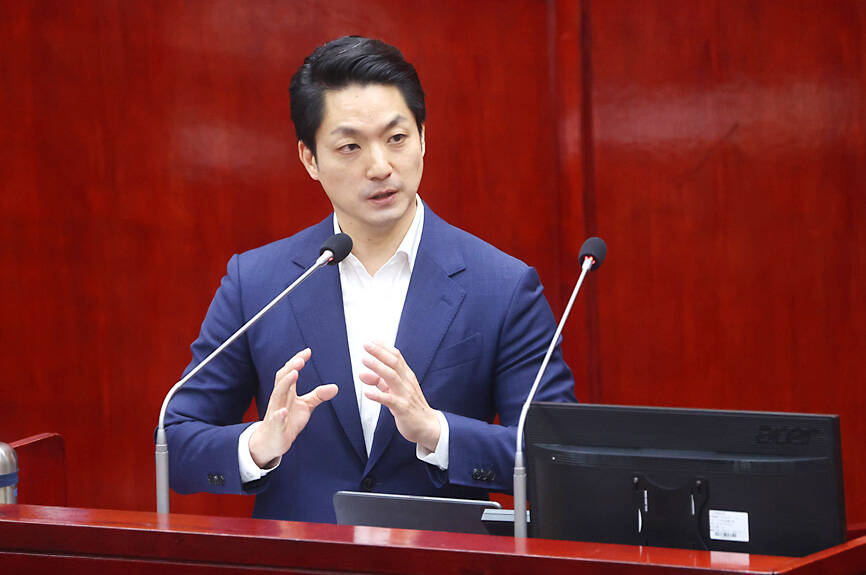Taipei Mayor Chiang Wan-an (蔣萬安) yesterday listed six flaws in EasyCard Corp’s Emerging Stock Market listing process, which was carried out in December last year before a change in municipal administration.
EasyCard Corp on Dec. 9 last year announced that its board had approved its plan to apply for listing on the Taipei Exchange’s Emerging Stock Market, only two weeks before then-mayor and Taiwan People’s Party Chairman Ko Wen-je (柯文哲) stepped down from his post on Dec. 25, with the corporation debuting on the stock market in January.
Saying that the Ko administration’s decision to list EasyCard appeared rushed and that it might dilute the government’s shares in the company, Chiang in June instructed city government officials to look into the case.

Photo: CNA
Reporting at the Taipei City Council yesterday, Chiang said the council found six flaws in the listing process:
‧ First, the company, which was operating normally and had abundant funding, did not follow the commercial practice of stating where the funds from the listing would be used or provide an operational or financial plan.
‧ Second, the company’s proposal stated that the city government would have a shareholding percentage of up to 74 percent; in reality, the government’s direct and indirect holdings combined totaled only 38.43 percent.
‧ Third, the company knew it would not be able to debut on the stock market during Ko’s term, but insisted on carrying out the listing, which is disrespectful of the new public opinion represented by the new mayor.
‧ Fourth, the Taipei Department of Budget had reminded the company about issues regarding the listing, but the listing was still approved, which disrespects professionalism.
‧ Fifth, the decision was reported to the city council through written documentation during a council recess, likely to avoid supervision.
‧ Sixth, it goes against political ethics and convention for a lame-duck government to continue pushing decisions when a new mayor has been elected.
While the investigation report states that the listing decision was made hastily and imprudently, and has several flaws, it did not find any illegally conduct, Chiang said.
To follow up on the issue, Chiang said he has asked the company to clarify its prospects and explain them to the public.
Democratic Progressive Party Taipei City Councilor Lin Yen-feng (林延鳳) said that a company lists on the Emerging Stock Market either to raise funds, increase brand awareness or prepare for listing on the mainboard, but EasyCard Corp does not meet any of these three purposes.
Chinese Nationalist Party (KMT) Taipei City Councilor Liu Tsai-wei (柳采葳) said that the EasyCard is widely used, associated with public interest and provides data for statistical analysis, but that the Ko administration casually made such a big decision only several days before the mayoral election, which appears ill-planned.
Social Democratic Party Taipei City Councilor Miao Po-ya (苗博雅) said that if the city government’s control over EasyCard Corp has dropped to less than 40 percent, Chiang’s administration should come up with a list of who was responsible for the decision.

SHIPS, TRAINS AND AUTOMOBILES: The ministry has announced changes to varied transportation industries taking effect soon, with a number of effects for passengers Beginning next month, the post office is canceling signature upon delivery and written inquiry services for international registered small packets in accordance with the new policy of the Universal Postal Union, the Ministry of Transportation and Communications said yesterday. The new policy does not apply to packets that are to be delivered to China, the ministry said. Senders of international registered small packets would receive a NT$10 rebate on postage if the packets are sent from Jan. 1 to March 31, it added. The ministry said that three other policies are also scheduled to take effect next month. International cruise ship operators

NUMBERS IMBALANCE: More than 4 million Taiwanese have visited China this year, while only about half a million Chinese have visited here Beijing has yet to respond to Taiwan’s requests for negotiation over matters related to the recovery of cross-strait tourism, the Tourism Administration said yesterday. Taiwan’s tourism authority issued the statement after Chinese-language daily the China Times reported yesterday that the government’s policy of banning group tours to China does not stop Taiwanese from visiting the country. As of October, more than 4.2 million had traveled to China this year, exceeding last year. Beijing estimated the number of Taiwanese tourists in China could reach 4.5 million this year. By contrast, only 500,000 Chinese tourists are expected in Taiwan, the report said. The report

The Forestry and Nature Conservation Agency yesterday launched a gift box to market honey “certified by a Formosan black bear” in appreciation of a beekeeper’s amicable interaction with a honey-thieving bear. Beekeeper Chih Ming-chen (池明鎮) in January inspected his bee farm in Hualien County’s Jhuosi Township (卓溪) and found that more than 20 beehives had been destroyed and many hives were eaten, with bear droppings and paw prints near the destroyed hives, the agency said. Chih returned to the farm to move the remaining beehives away that evening when he encountered a Formosan black bear only 20m away, the agency said. The bear

HORROR STORIES: One victim recounted not realizing they had been stabbed and seeing people bleeding, while another recalled breaking down in tears after fleeing A man on Friday died after he tried to fight the knife-wielding suspect who went on a stabbing spree near two of Taipei’s busiest metro stations, Taipei Mayor Chiang Wan-an (蔣萬安) said. The 57-year-old man, identified by his family name, Yu (余), encountered the suspect at Exit M7 of Taipei Main Station and immediately tried to stop him, but was fatally wounded and later died, Chiang said, calling the incident “heartbreaking.” Yu’s family would receive at least NT$5 million (US$158,584) in compensation through the Taipei Rapid Transit Corp’s (TRTC) insurance coverage, he said after convening an emergency security response meeting yesterday morning. National